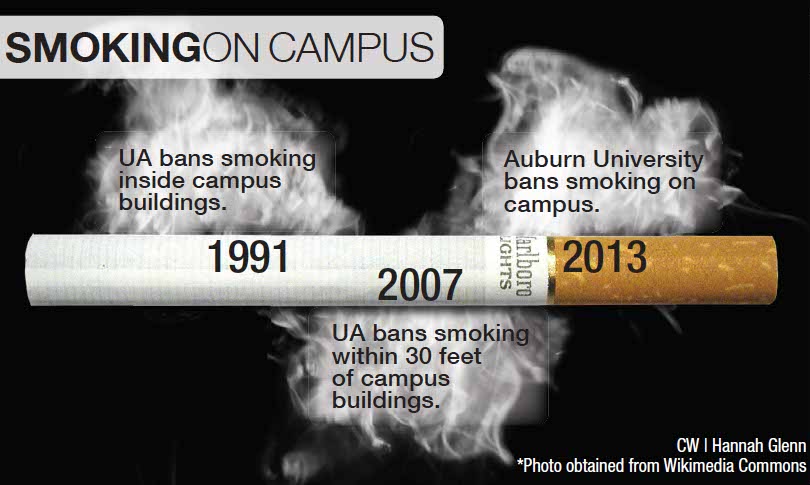With The University of Alabama standing as one of the last SEC school without a smoking ban on campus, UA students are stepping up to voice their opinions on the matter.
“The UA administration is evaluating a campuswide ban on smoking, based on input from constituents across campus,” Cathy Andreen, director of UA media relations, said.
For the past two years, UA students in the Student Government Association, Student Health Center groups and Smokefree UA have discussed their readiness to become a smoke-free campus and join the 1,178 campuses that have already passed a smoking or tobacco ban.
“SGA is not opposed to a smoke-free campus and would support any University policy that our student body feels might enhance their experience here,” Leela Foley, director of SGA media relations, said.
This year is the first time a petition for a smoke-free campus is being offered by the Tobacco Strategic Health Team, SHC Department of Health and Project Health. This gives students a voice to promote smoke-free awareness and support.
Andreen said the current policy prohibits smoking in all campus buildings as well as 30 feet from building entrances.
“There are 45 million smokers in America, but 125 million people are impacted by secondhand smoke,” said Delynne Wilcox, assistant director of the the department of health promotion and wellness at the SHC. “Smoking is not one of those things that [is] limited to only the health risks of the smoker. It impacts people around them.”
The American Cancer Society created the Great American Smokeout in the 1970s to bring awareness to health complications related to smoking and tobacco use. Every year on the third Thursday of November, participating organizations hold events to connect people with various resources to encourage them to quit smoking.
Wilcox said the University has participated in the Great American Smokeout for more than 13 years. Project Health had a table in the Ferguson Center Nov. 21 to promote the national event and to offer the petition for students to sign.
“Ideally, it would be great if we had a smoke-free campus because it would be another environmental support for students on why not to smoke,” Wilcox said. “It would decrease the secondhand smoke complications as well.”
However, not all students on campus feel like smoking poses a threat to students on campus.
“It doesn’t feel fair to tell people who smoke on the way to class that they can’t, but if everyone could be more courteous where they do it, then a lot of people would stop complaining,” Anna Neff, a sophomore majoring in advertising, said.
Wilcox said a large amount of college students try smoking when they arrive at college because they were discouraged to growing up, and some then become addicted to it.
Recently other campuses in the South have decided to make the shift to a smoke-free campus. The University of Mississippi inducted a smoke-free policy in August 2012 and began enforcing it in January 2013.
“Student committee members went to the faculty senate and staff council to gain support for the smoke-free policy,” said Leslie Banahan, the assistant vice chancellor for student affairs at the University of Mississippi. “We have had very few problems since full implementation of the policy.”
Banahan also said the Ole Miss’ Provost’s Office provided funding for cessation programs and medication to assist smokers with quitting.
The University of Tennessee also restricted smoking with a policy in September 2011.
“There were a lot of complaints about secondhand smoke, so we have a health initiative, and we wanted to drive down health insurances cost for the people who smoke,” said Mike Herbstritt, a team leader in human resources at the University of Tennessee.
Herbstritt also said rules on smoking have gotten more and more restrictive due to how vocal people were in their opposition.
In August, Auburn University implemented a smoke-free policy as well.
Several UA groups have already passed a smoke-free resolution. The Faculty Senate, Professional Staff Assembly and the Office and Clerical staff all support a smoke-free campus. UA Housing has drafted a smoke-free resolution for campus, and the College of Nursing has designated its grounds as tobacco-free along with the College of Community Health Sciences and the UA Recreational Center.
“Faculty, to professional staff, to students all recognize health benefits for our community for taking the next step, and they want to support the administration in making the decision,” Wilcox said.
UA’s SHC discourages students from using tobacco products for health reasons. It also encourages everyone to call the Alabama Tobacco Quitline at 1-800-Quit-Now, which is a free, user-friendly resource.
“We try to put this information out about its convenience several times a year,” Wilcox said.
Even though surveys have shown that not all students support the University being a smoke-free school, the petition allows students to voice their opinion.
“We always love hearing from students and understand that this issue is one students are passionate about, on both sides of the argument,” Foley said.
After the petition is collected, a letter of smoke-free support will be drafted to the UA president on behalf of all organizations and individuals who favor the ban.
Updated on January 6, 2014 to clarify that the University is not the last SEC school without a smoking ban, but rather one of the last.









